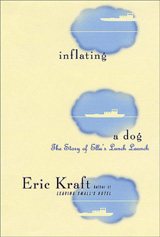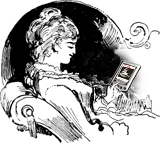

YOU CAN READ
THE FIRST HALF OF THE BOOK
HERE,
ONLINE, ONSCREEN,
OR
YOU CAN ORDER THE
PICADOR USA EDITION
AT
AMAZON.COM
OR
BARNES&NOBLE.COM
OR
YOU CAN DOWNLOAD
THE COMPLETE TEXT
AS AN eBOOK
AND
READ IT IN BED
OR
YOU CAN ORDER THE
AUDIO
BOOK
AND LISTEN
TO KRAFT READING
THE COMPLETE TEXT
TO YOU.

eBOOK
PAGE

CHAPTER
12 SAMPLE
AUDIO
BOOKS PAGE
|
Chapter 12
Not That Kind of Boy (or Girl)
 NEVER ASKED Patti to allow me to walk her home; it was always she who asked
me. She would say, “Hey, Peter, come on and walk me home,” and sometimes
she would add, “My mother loves it when you walk me home.”
NEVER ASKED Patti to allow me to walk her home; it was always she who asked
me. She would say, “Hey, Peter, come on and walk me home,” and sometimes
she would add, “My mother loves it when you walk me home.”
The shortest way to Patti’s house, the route we
most often took, began with a walk south along Purlieu Street, where we
had an audience of our schoolmates, walking with us or passing us in cars
and buses. Many of them had something to say as they went by, and
much of what they said was meant to be insulting, but it wasn’t insulting
enough to make me want to abandon the walks, because it was also thrilling.
After all, I was walking with the most desirable little package in Babbington
High, and everyone noticed.
When we passed Stillman’s delicatessen, we would
stop and look at our reflection in the window. Patti would smooth
her clothes and hair, and she would usually straighten me up a little,
too. When she had me looking the way she wanted me, she would give
me a little pat and say, “There. You look nice.”
Just beyond the delicatessen, we would slip through
a gap in a board fence and slip out of the public eye. We followed
a winding path through a scruffy wooded lot, where the ground was uneven,
and from time to time I would assist Patti with a touch or an offered hand,
which she would accept. When we left the wooded lot, we would walk
along the edges of the back yards of three houses occupied by old women
with nothing better to do than watch us walk by and cluck their disapproval.
Then we would approach Patti’s house from the rear, but we would always
go around it and enter from the front, because Patti’s mother thought it
was common to let guests in through the back door.
Patti’s mother was always glad to see me, and once,
after I had left and was walking around the side of the house on my way
home, I heard her exclaim, “What a nice boy he is! Just the kind
of boy a mother wants her daughter to bring home.”
On my way from Patti’s to my house that afternoon,
walking back along the path through the wooded lot, I tried to read its
litter as an archeologist would, looking at the beer cans and cigarette
packages and condom wrappers for some sign that would tell me whether this
was a place where Patti’s charms had been bestowed, had been enjoyed.
I couldn’t tell. When I reached Stillman’s, I looked at myself reflected
in the window, in my corduroy pants and checked shirt, and I thought that
I might as well be wearing a sign that said Nice Harmless Little Boy.
By the time I reached home I was thoroughly depressed.
I didn’t want to be that kind of boy, and I comforted myself by telling
myself that really, deep down, in the secret recesses of my heart, I wasn’t
that kind of boy at all.
ON THE DAY WHEN Patti walked me home for the first time, we didn’t
pass Stillman’s deli, since I lived in the opposite direction, but we did
pass the Babbington Heights Florist Shop, and we stopped there to look
at ourselves in the window. I was stunned by what I saw. There
was something about seeing us standing there side by side and being on
the way home, to my house, to introduce Patti to my mother, that made me
think I could see Patti as my mother would see her. My jaw dropped;
my eyes popped. I looked her up and down, and I looked her up and
down again.
“Hey, what’s with these looks you’re giving me?”
she asked my reflection.
I couldn’t tell her that I feared that everything
about her that appealed to me was going to scare the living daylights out
of my mother, so I said, “It’s—I’m just—”
“Yeah?”
“I think my mother—look—I—”
“You think I look like your mother?”
“No! I—”
“You don’t want me to meet your mother, do you?”
“What? What makes you think—”
“You don’t want your mother to meet me.”
She looked down at the sidewalk. Her feet,
in sexy little black boots that came to her ankles, were pressed
together, side by side. She held her arms straight down with her
fists clenched. Her brow was furrowed, and she was pouting.
“I know what they say about me,” she said.
She turned toward me, and there was a tear in her eye.
“You know what they say about me, don’t you? ‘She’s not the kind
of girl you’d take home to meet your mother,’ that’s what they say.”
She raised her head high and stuck out her chin. “But I’m not that
kind of girl,” she claimed. “I’m not the kind of girl you wouldn’t
take home to meet your mother.”
She turned back toward the florist’s window.
So did I. We both inspected her reflection.
“Am I?” she asked softly.
“No,” I said, although she might as well have been
wearing a sign that said Slut. “Come on.” I took her hand,
and we held hands all the way to my house, and all that way I was hoping
that my mother might not be at home when we got there and hoping that what
I hoped didn’t show.
|
|





